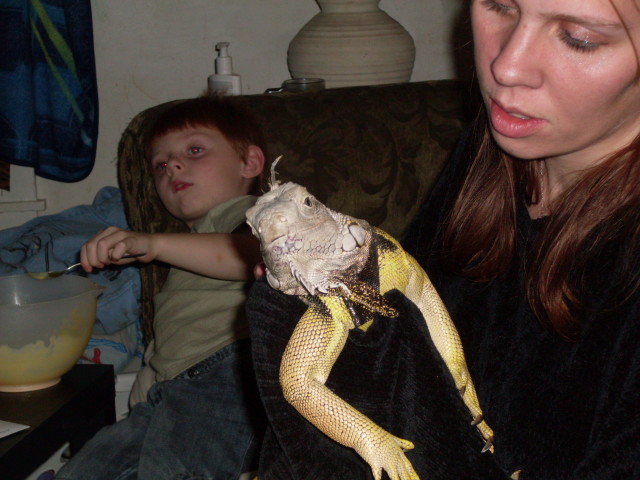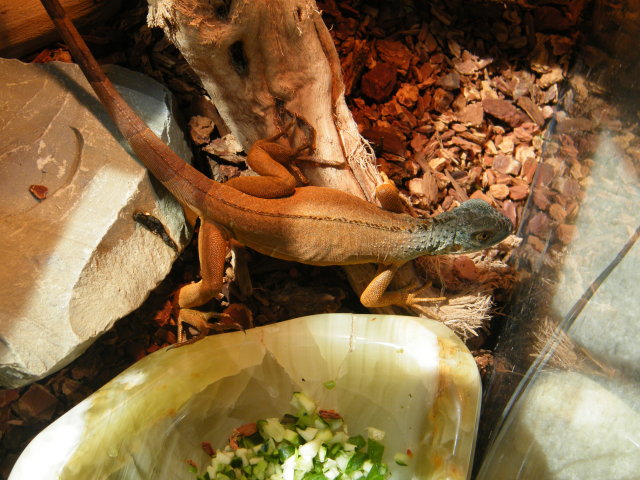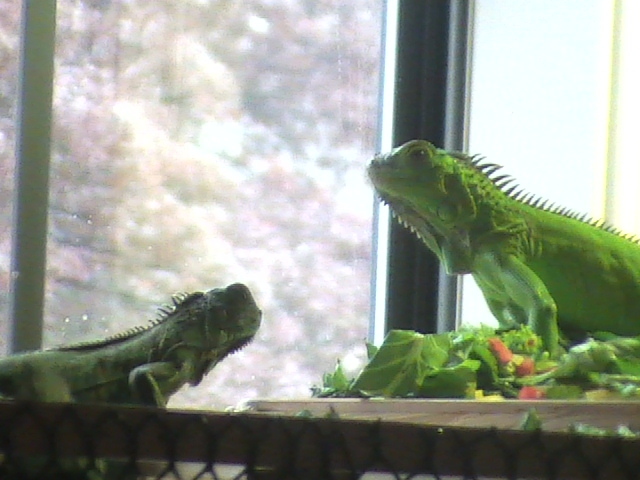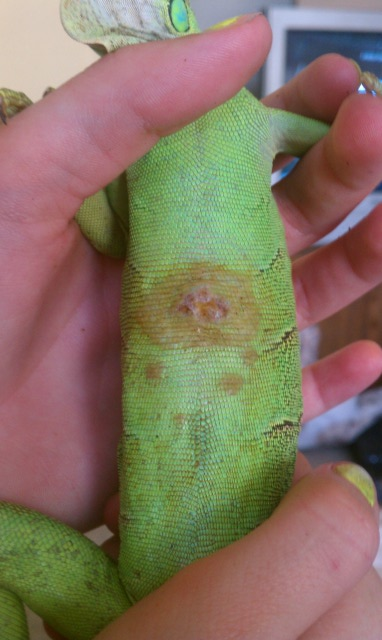Questionis it ok that my iguana is 3 years old but is only 10 inches long SVL? By the way the is snout to vent length not including the tail.
AnswerDear Brandon,
I have pasted a size and growth chart into my response so you can gauge where your iguana is as opposed to where he/she is supposed to be for that age group. It appears that your iguana is somewhat under-developed, but not by too much. According to the chart, your iguana should be ranging from 12-14 inches snout to vent by age 3. I can give some insight into iguana growth and development for you:
1- The size of a healthy iguana largely depends on country of origin and gender. Most iguanas sold as pets in retail stores are from Central America, but some can also be from South America. Even so, there are many countries in which iguanas are bred for export to the U.S. including El Salvador and Honduras being the most popular. This means that a female from one country may be bigger than a male from another country and vice versa. Gender does also play a large role because female iguanas are usually smaller than male iguanas of the same ancestry.
2- Notice how I wrote the size of a HEALTHY iguana largely depends on the country of origin and gender. This is assuming that your iguana is in optimum health. Most iguanas, actually 80% of captive iguanas could stand to have their diets, lighting, and husbandry improved in some aspect. I will tell you what the most common reasons for under-developed iguanas are:
A) Lack of UVB lighting. Most reptile basking lamps only emit UVA and without UVB, an
iguana CANNOT digest calcium, so they develop Metabolic Bone Disease. This is a
calcium deficiency and their bones become starved and weak. Be sure to have a UVB
source on your iguana for 10-12 hours per day. Consider buying the bulb Exo Terra
"Solar Glo" Sun Simulating lamp. It has all you need in one, it has UVA for heat and
UVB for healthy calcium absorption, plus it has a 6 month warranty and an automatic
shut-off for when it gets too hot.
B) Poor Diet. Remember what I am about to tell you: Lettuce, insects, any sort of meat,
spinach, carrots, cabbage and broccoli are BAD FOODS! These are the most common
foods people think they should feed their iguanas but shouldnt! Iguanas should eat
collard greens, mustard greens, turnip greens, squash, pumpkin, green beans, sweet
peas, fruits, dandelion, escarole, parsnips and assorted flowers. An iguana should be
getting a diverse diet and also a vitamin supplement which contains calcuim at least
once per week.
C) Poor Living Conditions. If your iguana is not warm enough, it cannot digest food.
Digestion starts at 87 degrees. An iguana's immune system will also become supressed
if it is not warm enough. If your iguana doesn't have enough room to climb and enough
branches to climb, it cannot develop muscle tone and will be thinner and weaker than
it should. If your iguana does not get a large shallow water basin to soak it, he
could become dehydrated.
These are the most common reasons iguanas become underdeveloped. I honestly always think the first thing about the UVB light. Plus, even if you have one, they need to be replaced every 6 months or they no longer work well.
Please make some adjustments to your iguana's diet, lighting and living conditions if necessary. Also, please do not allow him to be stressed out by keeping him on an erratic sleeping and waking schedule. Iguanas love routine, they want to go to sleep and wake up at the same time everyday. They need to sleep in the dark also, so if they are kept awake and are disturbed or constantly being handled, etc., they become stressed and their health can suffer.
AGE LENGTH WEIGHT
Hatchling (equivalent of an infant) 2.5-3.5 inches 90 grams
1 year 8-9 inches 1 - 1.5 lbs
2 years 11-12 inches 2-4 lbs
3 years 12-14 inches 4-6 lbs
4 years 14-16 inches 5-8 lbs
5 years 18-20 inches 10-15 lbs
6 years 20-22 inches 14-18 lbs
7 + years 20-24 inches 15-20 lbs.
Sincerely,
Sara J Gwerder
President
Raptor Rescue Iguana Sanctuary
Shreveport, LA
www.RaptorRescue.org

 My pet iguana
Question
My iguana tail
My iguana wa trying to r
My pet iguana
Question
My iguana tail
My iguana wa trying to r
 my 4 year old iguana
Question
godzilla our 4year old
me and my fiancee purch
my 4 year old iguana
Question
godzilla our 4year old
me and my fiancee purch
 thanks
Question
marley
thanks for all the info. a giveaw
thanks
Question
marley
thanks for all the info. a giveaw
 rescued iguana
Question
2 Igs
Hello! We rescued a small green iguana t
rescued iguana
Question
2 Igs
Hello! We rescued a small green iguana t
 Stomach problem
Question
Scab is now gone When scab was present &
Stomach problem
Question
Scab is now gone When scab was present &